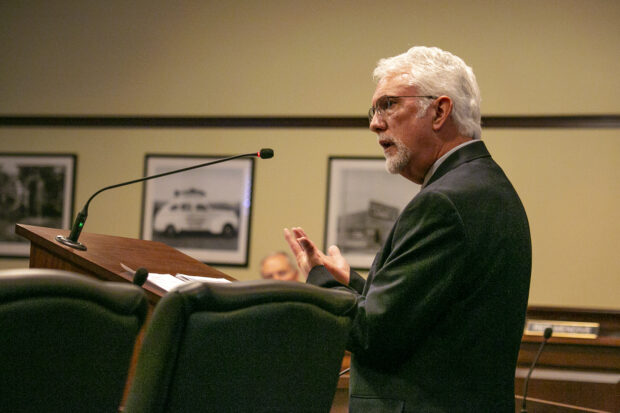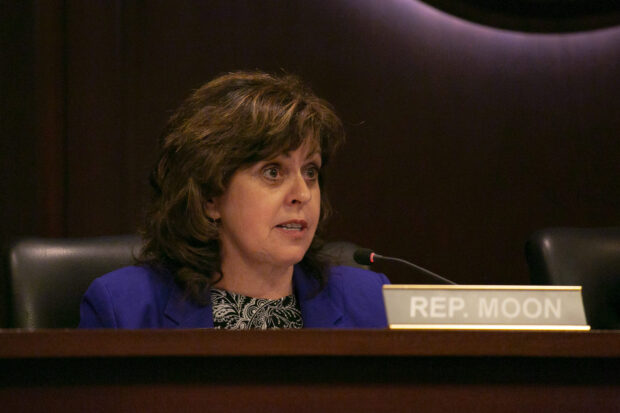
The House Education Committee is quickly diving into a “truckload” of agency rules, setting the stage for a showdown over K-12 academic standards.
During the first day of legislative committee hearings Tuesday, lawmakers heard an overview of the nuanced and wonkish rules review process that is expected to dominate the first three weeks of the 2020 session.
After the Legislature did not take the normal housekeeping step of reauthorizing agency rules in 2019, Gov. Brad Little trimmed thousands of pages of rules and temporarily reauthorized all the rest.
That means that an eager Legislature gets to scrutinize every single rule on the books, not just the new rules developed over the summer.
Rules are a big deal in Idaho because they carry the force of law. Thousands of pages of rules cover everything from academic standards and graduation requirements to immunization guidelines.
“What you are looking at is a truckload of rules,” administrative rules coordinator Dennis Stevenson told House Education.
Some legislators, with the Idaho Freedom Foundation standing firmly in their corner, have signaled over the fall and winter that they will use this opportunity to scrutinize and attempt to reject Idaho Core Standards in English language arts and math. A set of science standards, approved in 2018 after three years of debate over wording, is also likely to receive considerable scrutiny.

“For conversation sake, what would be the procedure if we wanted to remove Common Core in its entirety?” Rep. Dorothy Moon, R-Stanley, asked Stevenson.
“I believe you would simply go in to the ‘incorporated by reference’ section (of the rules) and say goodbye to that,” he said.
It may actually be a bit more complicated than that if the Legislature wants to repeal the standards.
Several different forms of rules carry slightly different procedures. But, generally speaking, legislators can approve a rule in its entirety, reject a rule in its entirety or reject a portion of a rule.
The rub is that both legislative chambers would have to agree in order to do away with the standards.
So, if House Education votes to repeal all English and math standards, the Senate Education Committee would have to agree to remove the same standards in order for the change to stick. If the Senate doesn’t agree, the standards would stay.
But if both houses voted to reject the standards, Idaho schools would no longer have academic standards on the books.
House Education Vice Chairman Ryan Kerby, R-New Plymouth, will oversee the rules review, which begins Wednesday morning.
No date for a Common Core or science standards hearing has been set, but Kerby and House Education Lance Clow, R-Twin Falls, said they would announce such dates in advance.
“If committee members would like to discuss something, or any motion to extract (a rule), let us know so we can pull it out for a separate hearing if we want to have a discussion on math or English or science standards, we will pull it out and discuss those,” Kerby said.
Because this level of rules review may be unprecedented in Idaho, it’s not certain how long the process will take. Kerby said he would like the committee to be at a point of making motions on rules in 2 1/2 weeks, but he said the timeframe could be “overly ambitious.”
At any rate, rules review could drive the length of the legislative session. Clow said he has been instructed not to let his committee introduce and debate new bills until it has the rules process well in hand.
JFAC starts its work
Legislative budget-writers took their first in-depth look at Little’s spending plan Tuesday, and had only a handful of questions.
As is its custom, the Joint Finance-Appropriations Committee spent its first meeting of the session walking through the governor’s budget proposal. During the recap, Little budget chief Alex Adams restated many of the governor’s talking points: The budget is frugal, designed to mitigate the effects of a possible recession, but written to meet the state’s “moral and constitutional obligation” to its school children.
Little on Monday rolled out a $4 billion budget proposal for the fiscal year beginning July 1 — a 3.75 percent spending increase. This spending hike represents the smallest increase a governor has sought since 2013, when Idaho was recovering from the Great Recession.
Public schools would see about a 4.1 percent increase, including a $30 million down payment to increase salaries for veteran teachers. Higher education would receive a .4 percent general fund increase, and Adams said other portions of the budget contain “strategic investments” in the college and university system.
JFAC members didn’t ask Adams about any budget line items. But Rep. Melissa Wintrow, D-Boise, asked why the Little administration is cutting budgets as the state’s economy continues to grow.
Little ordered the budget cuts — 1 percent this year, 2 percent next year — after revenue collections fell short of forecasts. But even so, revenue is expected to grow by 5.2 percent this year, a rate that would land Idaho in the top 10 in national rankings, Adams said.
“Idaho is red hot. It’s just tapering off,” he said. “(But) spending growth was racing faster than that revenue growth.”
While lawmakers didn’t ask questions about the budget, JFAC co-chair Sen. Steve Bair still thought Tuesday’s meeting was useful. Little’s State of the State address was shy on budget details, said Bair, who spent much of Monday with legislative staff trying to fill in the blanks. Tuesday’s hearing provided “quite a bit of clarity” about Little’s goals, said Bair, R-Blackfoot.
One of JFAC’s next moves will be to approve $19.1 million in midyear spending cuts — affecting most state agencies, including higher education, but not K-12. The committee will likely approve the budget cuts in a single, omnibus bill, rather than spending days reviewing the cuts on an agency-by-agency basis, Bair said.
JFAC will spend the next six weeks reviewing agency budget requests for next year. On Jan. 20, the committee kicks off “Education Week,” with presentations from college and university presidents and state superintendent Sherri Ybarra.
